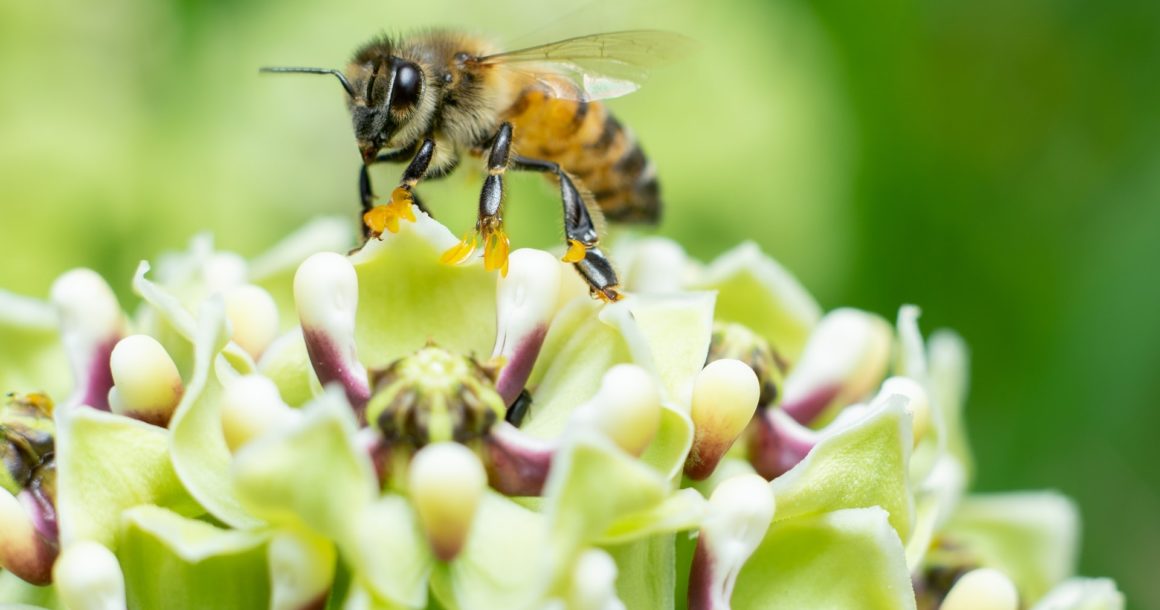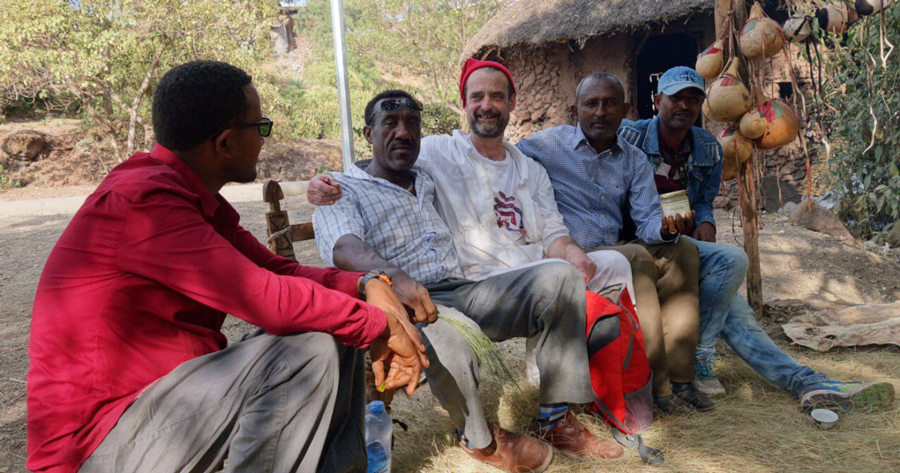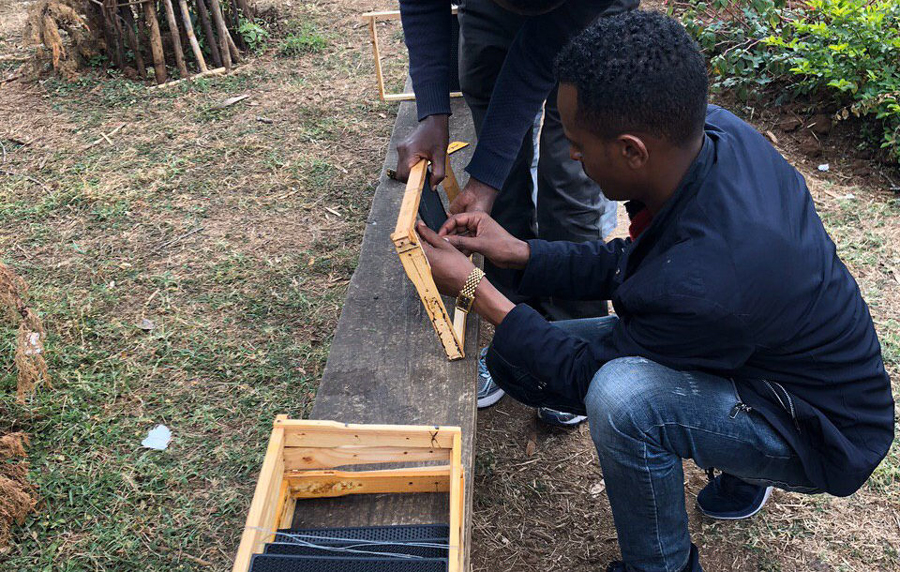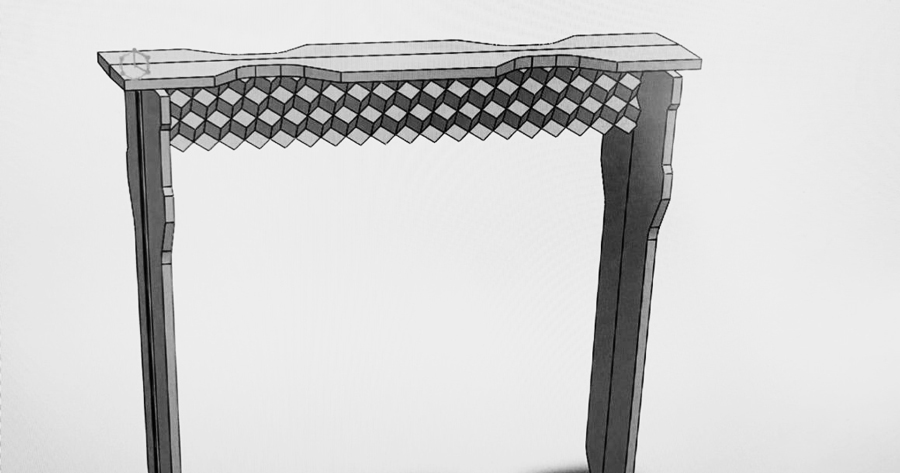This social startup revolutionizes the way how to protect bees

Health4Bees equips beekeepers with all they need to keep their bee hives healthy, among others by analyzing the environmental data collected by the bees themselves.
Beekeeper, inventor, bee protection activist or start-up founder? All in one.
Markus Bärmann is a professional beekeeper and bee expert who gathered knowledge about seeking across the globe for decades. He has worked in apiculture facilities and research centers in Nepal, the United States, New Zealand, France and Switzerland. Besides, he has his own bee hives in Germany.
Markus knows the sector with its diverse structure ranging from industrial honey production to hobby beekeeping like no other. And he takes action to overcome the sectors challenges, like the “Bienensterben”, the growing bee mortality. As early as 2001 he filed a patent to reduce the harmful Varroa mite with an organic, environmental friendly, chemical treatment. He recently added another patent which makes the application of the treatment easier and safer. Markus laughs: “The notion of Bienensterben, now a standard term in the German language, was not known at the time”. However, the problem was already apparent back then. The situation has nevertheless worsened, above all due to the accumulation of pollutants in the environment. Markus does not hide that he blames the large-scale industrial agro-chemical industry for the damage. “The beekeeper just sees that the Varroa mite is troubling his bees. What he doesn’t see is that the bees would get along much better with the mite if they were not weakened by toxic substances in the environment,” explains Markus. He adds: “If we keep the pollution level low, we can massively reduce the use of drugs against the Varroa mite. It’s as simple as that.”
«If we keep the pollution level low, we can massively reduce the use of drugs against the Varroa mite»
Markus Bärmann
As the political decision-making process is slow, Markus decided to take initiative himself. Together with his partner Heike Holzum, he recently founded the social startup Health4Bees. The companies mission is to enable beekeepers to keep their bee colonies healthy – and this with amazingly simple means, which combine a holistic view with modern technology.

Markus Bärmann visits the Health4Bees cooperation partner in Ethiopia in January 2020.
A holistic approach combined with modern technology
Solution #1: A smartphone app to locate environmental toxins in the catchment area of the beehive
Bees not only collect nectar and pollen, but also data. They are incredibly effective data collectors. One bee visits about 200 flowers per day. A healthy colony of 20,000 bees pollinating four million flowers a day. With the collected nectar and pollen, a bee colony provides an immense amount of data on whether, for example, pesticides were used or whether the soil is contaminated.
«A healthy bee colony collects data of several million flowers per day through the nectar and pollen.» Markus Bärmann
Health4Bees is developing applications for the beehive for this purpose, which allow a fast and cost-effective evaluation of relevant environmental data. The beekeeper only has to read the relevant data when replacing the device (“middle walls”) where the bees build the honeycombs.
The goa is a smartphone app that enables beekeepers to exchange the knowledge about environmental toxins collected by the bees between beekeepers. As soon as data from overlapping catchment areas are evaluated, the area where a particular environmental toxin comes from can be narrowed down precisely. The beekeeper can then decide whether to relocate his colony or find ways to eliminate the harmful environmental influences.
Solution #2: Replacement of contaminated beeswax in the beehive through biopolymers
It was rather a coincidence that Markus came across another challenge. During the first test measurements, he noticed that the evaluation yielded inaccurate results because of toxins which already were inside the beehive right from the beginning. He realized that often beekeepers themselves unknowingly introduce environmental toxins by using contaminated accessories that are widely available on the market. In particular: the pre-stamped plates of beeswax, which the beekeeper inserts into the beehive when replacing the older honeycombs which the bees built with their own wax. The old honeycombs are usually melted down by the beekeeper and then sold in specialist shops either to have them reworked or exchanged for a new one. The beekeeper often does not get his own beeswax back, but is part of an exchange system.
«Industrial agro-chemistry is all about securing the companies’ market shares, not the common good. In such a competitive environment, companies tend not to be willing to disclose their accumulated knowledge of environmental toxins and beekeeping in an open source database.« Markus Bärmann
The core problem is: More new wax is needed than old wax is provided by the beekeepers. In order to meet the demand for new prestamped plates of beeswax, wax of unknown origin is added. This can also be artificial, synthetic wax, which was not produced by bees themselves. This wax of unknown origin, if contaminated, can lead to the death of the young bee brood – and consequently to the death of the entire bee colony. Such a contamination is not visible to the beekeeper at first. Up to now, only cost-intensive analyses, which often exceed the purchase price of the wax many times over, can provide information about the quality.
To solve this problem, Health4Bees has developed an alternative to the pre-stamped plates of contaminated beeswax, which consists of a bio-polymer that meets the standards of the food industry and is free of harmful substances. For the manufacturing process, Health4Bees teamed up with a German family business, the company Mankoplast from Verl.
Prototyping in Ethiopia
In February, shortly before the corona-induced lock-down began, Markus Bärmann spent several weeks in Ethiopia. The aim was to test which biopolymer-formed honeycombs are best accepted by the bees. As part of a technology partnership with the medium-sized family business Maneplast from Verl, Health4Bees is developing middle walls in which beekeepers can be sure that the combs are not made of contaminated beeswax.
Why the long journey to Ethiopia? The main reason was that the bees in Germany have a break in the winter and thus fail as beta testers. At the same time, Health4Bees was able to establish partnerships with other international initiatives such as Bees for Development.
The tests were successful, so that the production of the clean beeswax walls can now start.

Test of different shaped honeycombs made of biopolymers

Definition of the exact shape for the serial production of the bio-polymer panels
A lean start-up determined to stay independent
Health4Bees works with very lean structures, with an astonishing small budget. ‘The company must finance itself,’ says Markus, by selling the biopolymer panels. The planned smartphone app will be a service which will be made available to beekeepers free of charge. This is because the death of bees is a social challenge that requires a collaborative approach. A payment model is likely to be implemented for the pharmaceutical industry.
«We have designed our company governance being guided by how bee colonies organized themselves. Nothing is decided alone, but always by consensus» Markus Bärmann
The pharmaceutical industry also collects environmental data which effects beekeeping, but does not make the information publicly available. Markus is sceptical when it comes to the role of large-scale corporations: ‘In the agro-industry sector, it’s all about fighting for market shares, short-term profits and the company’s survival. In such a competitive environment it does not surprise that corporations find it difficult to disclose their collected data on environmental toxins and beekeeping’. However, the withholding of information is ultimately at the expense of the bees and thus of society as a whole.
With their start-up, Markus and Heike want to remain independent. Better to grow slowly than getting investors on board who are not mission-aligned. Health4Bees is supported by the mentoring program of the Duisburg Impact Factory. The program, which was set up by Oliver Kuschel and Dirk Sander with support of, among others, the Beisheim Foundation and the family-led Haniel Group of Companies, offers a supporting environment for founders who develop scalable social business models.
Engage in bee protection!
- Abstain from pesticides in your own garden and plant or sow native flowers whose blossoms provide food for the bees. This can also be on a small balcony.
- Don’t use pickled seeds, because these are treated with insecticides which later can be found in the whole plant. Untreated, organic seeds are offered, for example, by Bingenheimer Saatgut AG, which also supplies many health food shops with organic seeds.
- Even what is known as weeds is often a vital food source for insects, such as dandelion for bees or stinging nettle for butterfly caterpillars.
- Create drinking places with floating aids (e.g. pieces of bark) for bees during dry periods. Important: Use only water, without added sugar or honey.
If you are looking for information about bees or want to go deeper into the subject, contact Health4Bees directly or the following places (instead of buying a hobby beekeeper set in a hardware store):
- Mellifera The association, founded in 1986, is committed to ecological and appropriate beekeeping and includes various local groups.
- Netzwerk Blühende Landschaft The initiative is committed to creating flowering areas for bees, from your own balcony to the roundabout in the city.
- Aurelia Stiftung According to the motto “It is not the bee that needs to be changed. Our behaviour must change” the foundation is committed to beekeeping appropriate to the species. Click here for the current petition ‘Protect the bee from genetic engineering’(in german)
- Imkernetzwerk Bayern This Beekeepers’ Network, should not be confused with the German Beekeepers’ Association with its Regional Associations, which look after professional beekeepers. The Imkernetzwerk Bayern is a registered association of Bavarian beekeepers, which is committed to ecological beekeeping.
- Grome Harvest The start-up from Duisburg offers companies garden sponsorships, in which employees garden, cook and – through a partnership with Health4Bees – keep bees together in professionally accompanied formats.
Our book tip: Honeybee Democracy by Thomas Seeley
The well-known US-American behavioural scientist explains in his book Honeybee Democracy why the queen bee is not an absolute ruler. Rather, he says, bees decide together as a swarm, they collectively investigate a situation and debate lively in order to ultimately reach a consensus.

